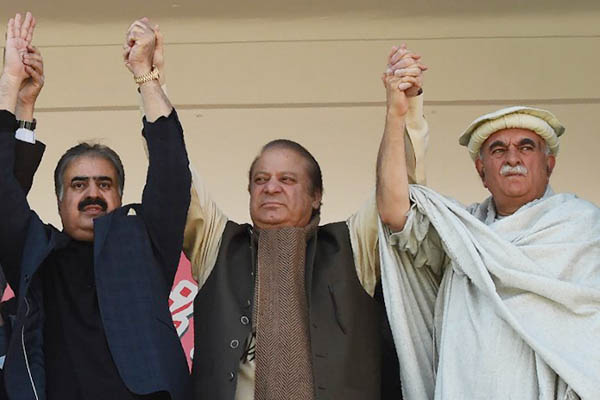
Balochistan Chief Minister Sanaullah Zehi, left, with ousted prime minister Nawaz Sharif, center, and Pakhtunkhwa Milli Awami Party chief Mehmood Achakzai. Banaras Khan—AFP
Could the situation in the provincial assembly actually impact the 2018 general elections?
The Pakistan Muslim League (Nawaz)—as well as talking heads serving as analysts on local TV shows—will no doubt consider the ongoing troubles of the Balochistan Assembly a conspiracy to block the 2018 general elections. Astrologers have already predicted the upcoming polls will not be held, foreseeing developments that are “normal” in troubled Pakistan. On Dec. 2, the 65-member Balochistan Assembly, 53 of whom are ministers and support the PMLN, turned against Chief Minister Sanaullah Zehri and brought a vote of no-confidence against him. That means a new majority will choose a new chief minister or let the assembly be dissolved.
Suspicion will equally be aroused by the action of PMLN’s own home minister, Sarfraz Bugti, who played his cards very close to the Army deployed against Baloch rebels. He has resigned from his post and joined other PMLN members wanting to get rid of the chief minister who was touring abroad. But the plaint this time too is typical of Balochistan: development funds disappearing mysteriously and large areas being left out of the loop of governance. Ominously, veteran Baloch politician Mehmood Khan Achakzai of the Pakhtunkhwa Milli Awami Party (PKMAP) has suggested that “the developments in Balochistan are part of a wider plot against the PMLN government and its chief Nawaz Sharif.”
The rebels against Zehri, most from his own party, say the main reason for their actions is non-release of development funds and lopsided development in “only two districts, including Khuzdar and Qila Abdullah.” Also, that “there is a plan to construct 300 dams only in Gulistan area of Qila Abdullah while other areas are being ignored.” Zehri is the tribal chief of Jhalawan and was born in Khuzdar. Governor Mohammad Khan Achakzai of PKMAP was born in Qila Abdullah. Is it the old “normal” of Balochistan? Or is it rats leaving the sinking PMLN ship?
